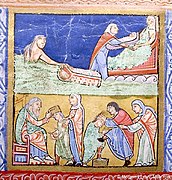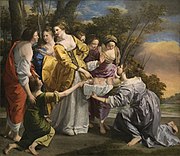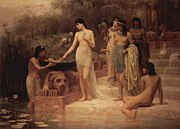Pharaoh's daughter (Exodus)
| Pharaoh's daughter | |
|---|---|
 Finding of Mosesin theDura-Europos synagogue,c. AD 244 | |
| First appearance | Book of Genesis |
| In-universe information | |
| Alias | Thermouthis (birth name, Judaism) Bithiah (adopted name, Judaism) Merris (Christianity) Merrhoe (Christianity) |
| Spouse | Mered |
| Children | Moses(adoptive) |
| Religion | Ancient Egyptian religion(formerly) Yahwism(convert) |
| Nationality | Egyptian |
ThePharaoh's daughter(Hebrew:בַּת־פַּרְעֹה,lit. 'daughter ofPharaoh') in the story of thefinding of Mosesin the biblicalBook of Exodusis an important, albeit minor, figure inAbrahamic religions.Though some variations of her story exist, the general consensus amongJews,Christians,andMuslimsis that she is the adoptive mother of the prophetMoses.Muslimsidentify her withAsiya,theGreat Royal Wifeof the pharaoh. In either version, she saved Moses from certain death from both theNile riverand from thePharaoh.As she ensured the well-being of Moses throughout his early life, she played an essential role in lifting the Hebrew slaves out of bondage in Egypt, their journey to thePromised Land,and the establishment of theTen Commandments.
Her name
[edit]TheExodus 2:5) does not give a name to Pharaoh's daughter or to her father; she is referred to in Hebrew asBaṯ-Parʿo(Hebrew:בת־פרעה), "daughter of Pharaoh."[1]TheBook of Jubilees47:5 andJosephusboth call herThermouthis(Greek:Θερμουθις), also transliterated asTharmuthandThermutis,the Greek name ofRenenutet,a fertility deity depicted as anEgyptian cobra.[2][3][4][5]
Some within Jewish tradition have tried to identify her with a "daughter of Pharaoh" in1 Chronicles 4:17 named Bitya.[6]An example of this is found inLeviticus Rabbah1:3,[7]which refers to her asBit-Yah(Hebrew:בתיה,lit. 'daughter ofYahweh'). It states she was given the name for her adoption of Moses, that because she had made Moses her son, Yahweh would make her his daughter.[8]In1 Chronicles 4:18, she is calledha-yəhudiyya(Hebrew:הַיְהֻדִיָּ֗ה,lit. 'the Jewess'), which some English translations of the Bible treat as agiven name,Jehudijah(Hebrew:יהודיה,romanized:yehudiyyah,lit. 'Jewess'), notably theKing James Version,but the word is anappelative,there to indicate that Pharaoh's daughter was no longer apagan.[9][10][11]However, some have criticized the idea that the "daughter of Pharaoh" in 1 Chronicles named Bithiah is the same as the one who adopted Moses since there is no textual indication that this is the case and the chronology may not be consistent with that conclusion.[6]
In Judaism
[edit]Now the daughter of Pharaoh came down to bathe at the river, and her maidens walked beside the river; she saw the basket among the reeds and sent her maid to fetch it. When she opened it she saw the child; and lo, the babe was crying. She took pity on him and said, "This is one of the Hebrews' children." Thenhis sistersaid to Pharaoh's daughter, "Shall I go and call you a nurse from the Hebrew women to nurse the child for you?" And Pharaoh's daughter said to her, "Go." So the girl went and called thechild's mother.And Pharaoh's daughter said to her, "Take this child away, and nurse him for me, and I will give you your wages." So the woman took the child and nursed him. And the child grew, and she brought him to Pharaoh's daughter, and he became her son; and she named him Moses, for she said, "Because I drew him out of the water."
— RSV, Exodus 2:5–10
In the Jewish narrative, Pharaoh's daughter first appears in the Book of Exodus, in Exodus 2:5–10. The passage describes her discovery of the Hebrew child, Moses, in therushesof the Nile River and her willful defiance of her father's orders that all male Hebrew children be drowned in the "Yeor" (Hebrew:יְאוֹר) (Nile), instead taking the child, whom she knows to be a Hebrew, and raising him as her own son. TheTalmudand theMidrash Vayoshaprovide some additional backstory to the event, saying that she had visited the Nile that morning not to bathe for the purpose of hygiene but forritual purification,treating the river as if it were amikveh,as she had grown tired of people'sidolatrousways, and that she first sought to nurse Moses herself but he would not take hermilkand so, she called for a Hebrewwet nurse,who so happened to be Moses' biological mother,Jochebed.[1][2][3][4]
Rabbinic literaturetells a significantly different take on the events that day, portraying Pharaoh's daughter as having suffered from a skin disease[5](possibly leprosy[12]), the pain of which only the cold waters of the Nile could relieve, and that theselesionshealed when she found Moses. It also describes an encounter with the archangelGabriel,who kills two of her handmaidens for trying to dissuade her from rescuing Moses.[5]After Moses is weaned, Pharaoh's daughter gives him his name,Moshé(Hebrew:מֹשֶה) purportedly taken from the wordmāšāh(Hebrew:מָשָׁה,lit. 'to draw from water'), because she drew him from the water, but some modern scholars disagree with the Biblical etymology of the name, believing it to have been based on the Egyptian root m-s, meaning "son" or "born of," a popular element in Egyptian names (e. g.Ramesses.Thutmose) used in conjunction with a namesake deity.[13][14]
According to Jewish tradition, in her later years Pharaoh's daughter devotes herself to Moses, and to Yahweh; she celebrates the firstPassover Sederwith Moses in the slaves' quarters and for that, her firstborn is the only Egyptian to survive the final of theTen Plagues of Egypt,and leaves Egypt with him for thePromised Land.Citing a passage in the Books of Chronicles (1 Chronicles 4:17-18), some have maintained that she is the one who is said to have married a member of theTribe of Judah,Mered,and to have had children with him. Additionally, she is referred to there as a Jewess, indicating that she had accepted Yahweh as her own god.[1][2]Furthermore, the Jewish rabbis claim that, in theBook of Proverbs(Proverbs 31:15), she is praised inWoman of Valor.Further, the Midrash teaches that because of her devotion to Yahweh and her adoption of Moses, she was one of those whoentered heaven alive.[15]
In Islam
[edit]
Pharaoh's daughter name is not mentioned in the Quran. However, it was given in other sources such as the Hadith.
In the Hadith traced by Ibn ‘Abbas, he said: The Messenger of Allah ( Mohammed), peace and blessings be upon him, said: “On the night I was taken on the Isra (Night Journey), a pleasant scent came to me. I said: ‘O Gabriel, what is this pleasant scent?’ He replied: ‘This is the scent of the hairdresser, the daughter of Pharaoh, and her children.’ He continued, ‘What is her story?’ He said: ‘While she was combing Pharaoh’s daughter’s hair one day, the comb fell from her hand, and she said: “In the name of Allah.” Pharaoh’s daughter said: “My father?” She replied: “No, but my Lord and your father’s Lord is Allah.” She said: “Shall I inform him of this?” She replied: “Yes.” So, she informed him, and he called her and said: “O so-and-so, do you have a lord other than me?” She said: “Yes, my Lord and your Lord is Allah.” He then ordered a cow made of brass to be heated up, and then commanded that she and her children be thrown into it. She said to him, ‘I have one request to you,’ he said, ‘What is your need?’ She said: ‘I would like you to gather my bones and the bones of my children in one cloth and bury us.’ He replied, ‘That is your right upon us.’ He ordered her children to be thrown in front of her one by one until it was the turn of a suckling child she had. It seemed she hesitated because of him, he said: ‘O mother, plunge in, for the punishment of this world is lesser than the punishment of the Hereafter.’ So, she plunged in.”
This narration is found in Imam Ahmad’s “Musnad” (1/309), Al-Tabarani (12280).
In the Quran, Pharaoh's wife does not draw Moses from river Nile, her servants do, and Pharaoh, having learned of the boy's existence, seeks to kill him but she intervenes and Pharaoh changes his mind, allowing the boy to live. Mirroring the Judeo-Christian story,Jochebedis called to Pharaoh's palace to act as a wet nurse for him. Another wife of another pharaoh of exodus named Asiya professes Moses' belief in God (Allah).[16][page needed][17][better source needed]
Art and culture
[edit]Pharaoh's daughter is often included in Exodus-related art and fiction. Several artworks portray thefinding of Moses.
In medieval Irish legend, Pharaoh's daughter is namedScotaand is the ancestor of theGaels.[18]
InGeorge Gershwin's 1935 operaPorgy and Bess,the songIt Ain't Necessarily Somentions Pharaoh's daughter finding baby Moses.[19]
The Moses Chronicles(2015-), a novel-trilogy byH. B. Moore,includes Pharaoh's daughter. Parts of the story are written from her perspective.[20]
In her poem 'Epitaph', the American poetEleanor Wilnerdepicts Pharaoh's daughter as having raised Moses, whom she honed 'like a sword', to be a rebel within the palace household. SeeChapters into Verse,edited by Robert Atwan and Laurance Wieder (2000), New York: Oxford University Press, pp. 66-67.[21]
Drama-films depicting her includeThe Ten Commandments(1956),[22]the animated musicalThe Prince of Egypt(1998)[23]andExodus: Gods and Kings(2014).[24]TV-dramas includeMoses(1995).[25]
Gallery
[edit]-
Place where the pharaoh's daughter savedMosesfrom theNileriver, 1698 sketch made by Dutch travellerCornelis de Bruijnon his journey through Egypt. The local inhabitants pointed out this spot.
-
12th century
-
Moses Saved from the Waters(c. 1556),Bernaert de Rijckere
-
Moses Saved from the Waters(1633),Orazio Gentileschi
-
The Finding of Moses(17th century),Andrea Celesti
-
The Finding of Moses(1740),Giovanni Battista Tiepolo
-
The Finding of Moses(1862),Frederick Goodall
-
Moses Saved from the Waters(1894), Jacques Clement Wagrez
-
Pharaoh's Daughter Receives the Mother of Moses(c. 1900),James Tissot
-
Edwin Long,1886
-
Bithiah finds the infant Moses inThe Ten Commandments,1956
See also
[edit]References
[edit]- ^abc"The Story of Batyah (Bithiah) – A Transformed Identity".www.chabad.org.Retrieved2019-09-04.
- ^abcFlusser, David; Amorai-Stark, Shua (1993). "The Goddess Thermuthis, Moses, and Artapanus".Jewish Studies Quarterly.1(3): 217–33.JSTOR40753100.
- ^abJosephus,Antiquities of the Jews 9,5
- ^ab"Thermuthis – History's Women".Retrieved2019-09-11.
- ^abc"Renenutet | Ancient Egypt Online".Retrieved2019-09-11.
- ^abScolnic, Benjamin Edidin.2005.If the Egyptians Drowned in the Red Sea where are Pharaoh's Chariots?: Exploring the Historical Dimension of the Bible.University Press of America.p. 82.
- ^"Vayikra Rabbah 1:3".www.sefaria.org.
"These are the sons of Bitya daughter of Pharaoh" (I Chronicles 4:18) – Rabbi Yehoshua of Sikhnin said in the name of Rabbi Levi: The Holy One blessed be He said to Bitya daughter of Pharaoh: 'Moses was not your son, but you called him your son; you, too, are not My daughter, but I call you My daughter,' as it is stated: "These are the sons of Bitya," the daughter of God [bat Yah].
- ^"Daughter of Pharaoh: Midrash and Aggadah | Jewish Women's Archive".jwa.org.Retrieved2019-09-04.
- ^"BITHIAH".Jewish Encyclopedia.Retrieved2019-09-05.
- ^"Jehudijah Definition and Meaning – Bible Dictionary".Bible Study Tools.Retrieved2019-09-11.
- ^Kadari, Tamar. (1999)The Daughter of Pharaoh Is Bithiah.Jewish Women's Archive
- ^Kadari, Tamar."Daughter of Pharaoh: Midrash and Aggadah".The Encyclopedia of Jewish Women.Retrieved2021-05-09.
- ^"Was Moses' Name Egyptian?".www.bibleodyssey.org.Retrieved2020-04-01.
- ^"Strong's Hebrew: 4871. מָשָׁה (mashah) – to draw".biblehub.com.Retrieved2019-09-11.
- ^Segal, Rabbi Arthur (2010-08-11)."RABBI ARTHUR SEGAL: JEWISH RENEWAL: Jabez the Yahudahite".Rabbi Arthur Segal.Retrieved2019-10-10.
- ^Shahada Sharelle Abdul Haqq (2012).Noble Women of Faith: Asiya, Mary, Khadija, Fatima(illustrated ed.). Tughra Books.ISBN978-1597842686.
- ^Commentary on HexameronMPG 18.785
- ^Lennon, Joseph (2008).Irish Orientalism: A Literary and Intellectual History.Syracuse University Press. pp. 11–12, 36.ISBN9780815631644.Retrieved18 July2024.
- ^Seven Against Thebes.Oxford University Press. 1991. p. 111.ISBN9780195070071.
- ^"Book review: 'Bondage' is an engaging first book in Moses Chronicles series".Deseret News.Aug 1, 2015.Retrieved7 September2019.
- ^Chapters into Verse, edited by Robert Atwan and Laurance Wieder (2000), New York:Oxford University Press, pp. 66-67.
- ^Orrison, Katherine (30 March 1999).Written in Stone: Making Cecil B. DeMille's Epic The Ten Commandments.Vestal Press. p. 51.ISBN978-1-4617-3481-9.
- ^Reinhartz, Adele (2013).Bible and Cinema: Fifty Key Films.Routledge. p. 207.ISBN978-0-415-67720-2.
- ^Macnab, Geoffrey (1 December 2014)."Exodus: Gods And Kings - film review: Blood and big sets fail to make".The Independent.Retrieved27 May2022.
- ^Malena, Sarah; Miano, David (2007).Milk and Honey: Essays on Ancient Israel and the Bible in Appreciation of the Judaic Studies Program at the University of California, San Diego.Eisenbrauns. pp. 105–106.ISBN978-1-57506-127-6.
Bibliography
[edit]- Encyclopaedia Judaica,1972, Keter Publishing House, Jerusalem, Israel.
- Jewish Encyclopedia.com
- Bithiah. (n.d.). Hitchcock's Bible Names Dictionary. Retrieved January 28, 2008, from Dictionary.com website:[1]











